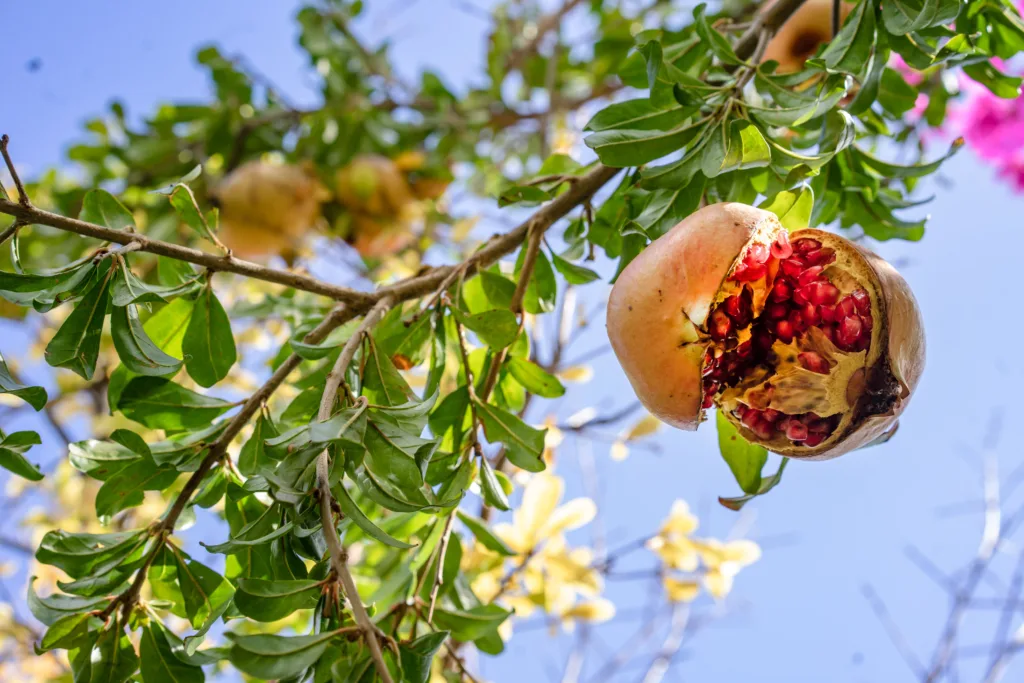Pomegranate is a delicious and nutritious fruit, but can be difficult to enjoy if you have Irritable Bowel Syndrome or other digestive issues. With its potential for triggering digestive distress, many people with IBS and other digestive disorders are wondering: Is pomegranate low FODMAP? Knowing the answer to this question can help ensure that you can enjoy this delicious fruit without triggering uncomfortable symptoms.
This article will answer the question of whether pomegranate is low FODMAP or not, as well as provide tips on how to incorporate it into your diet. We will also discuss what FODMAPs are and why they can be a problem for some people.Pomegranate is a type of fruit that is round in shape and has a leathery red rind containing numerous edible seeds.
Are Pomegranates Low FODMAP?
Pomegranates are a nutritious fruit that can be enjoyed as a snack or in salads, desserts, and other dishes. However, if you are following a Low FODMAP diet, you may be wondering if pomegranates are suitable for your meal plan. Fortunately, pomegranates are generally considered to be low FODMAP in small portions.
FODMAPs (Fermentable Oligosaccharides, Disaccharides, Monosaccharides And Polyols) are short-chain carbohydrates found in many foods that can be difficult to digest. People who suffer from irritable bowel syndrome (IBS) may find that following a low FODMAP diet helps to reduce their symptoms.
A single serving of pomegranate (1/2 cup or 75g) is considered to be low FODMAP and should not cause any digestive issues for most people following a Low FODMAP diet. It is important to note, however, that larger servings of pomegranate may contain higher levels of the FODMAP fructose and should therefore be avoided.
In addition to being low in FODMAPs, pomegranates are also high in vitamins A and C and provide an excellent source of dietary fiber. They also have numerous health benefits such as promoting heart health and helping to reduce inflammation.
In conclusion, pomegranates can generally be enjoyed in moderation when following a Low FODMAP diet. For best results, stick to the recommended serving size of 1/2 cup or 75g per day. As always, it is important to talk to your doctor or nutritionist if you have any questions about what foods are suitable for your individual dietary needs.
How to Identify Low FODMAP Fruits
Fruits are an important part of a healthy diet and provide essential vitamins and minerals. However, some fruits are high in FODMAPs (Fermentable Oligo-, Di-, Mono-saccharides And Polyols), which can cause digestive issues for those with IBS (Irritable Bowel Syndrome). To identify low FODMAP fruits, here are some tips:
• Check the ingredients list when buying packaged fruit products. Look out for any added sweeteners or syrups that may contain high FODMAPs such as fructose or sorbitol.
• Choose fresh fruit over dried fruit, as dried fruits tend to be higher in FODMAPs due to the dehydration process. For example, dates and apricots are high in FODMAPs when dried.
• Avoid fruits with skins that are tough or hard to digest, such as citrus fruits like oranges and grapefruits. These have higher concentrations of FODMAPs than their peeled counterparts.
Click here to preview your posts with PRO themes ››
• Stick to low-FODMAP fruits such as apples, bananas, grapes, blueberries, strawberries, raspberries, kiwi and mangoes. These can all be enjoyed in moderation without triggering digestive issues.
By following these tips you can enjoy the health benefits of eating fruit while avoiding any potential digestive issues.
Foods to Avoid on a Low FODMAP Diet
If you’ve been diagnosed with irritable bowel syndrome (IBS) or other gastrointestinal issues, your doctor may have recommended a low FODMAP diet. FODMAP stands for fermentable oligosaccharides, disaccharides, monosaccharides, and polyols. These are all types of carbohydrates that are poorly absorbed in the small intestine and can cause gastrointestinal distress when eaten in high amounts. It’s important to avoid high-FODMAP foods while on this diet to help reduce symptoms.
High-FODMAP foods include many common ingredients like garlic and onions, dairy products such as milk and yogurt, certain fruits like apples and pears, beans and legumes like chickpeas and lentils, certain grains such as wheat and rye, some sweeteners like honey and agave nectar, mushrooms, sugar alcohols like sorbitol and xylitol, artichokes, and cauliflower.
It’s also important to be mindful of added sugars in processed foods. These can often contain hidden sources of FODMAPs such as high fructose corn syrup or inulin. Read labels carefully to make sure the food is low-FODMAP before consuming it.
Although it may seem overwhelming at first glance to eliminate so many common foods from your diet, there are still plenty of delicious options available while following a low FODMAP diet. Eating plenty of fresh vegetables such as leafy greens and bell peppers is always a good choice. Low-FODMAP proteins include chicken breast, turkey breast, eggs, salmon fillets or canned tuna packed in water. Quinoa is an acceptable grain choice that is naturally low in FODMAPs. There are also many pre-packaged products available that are specifically designed for a low FODMAP diet.
It’s important to work closely with your doctor or a registered dietitian when following this diet to ensure you’re getting all the essential nutrients you need while still avoiding high-FODMAP foods. With some careful planning and creativity in the kitchen you can still enjoy nutritious meals while following a low FODMAP diet!
Why is a Low FODMAP Diet Beneficial for IBS?
Irritable Bowel Syndrome (IBS) is a common digestive disorder that can cause abdominal pain, bloating, gas, diarrhea, and constipation. A low FODMAP diet is the most recommended dietary approach for those with IBS. FODMAPs are short-chain carbohydrates found in foods such as wheat, onions, garlic, apples and dairy products that are poorly absorbed by the small intestine. Eating a low FODMAP diet reduces the amount of FODMAPs consumed, allowing the digestive system to rest and heal.
The benefits of a low FODMAP diet include reducing abdominal discomfort and pain associated with IBS. Research has shown that following a low FODMAP diet can improve symptoms in up to 75% of people with IBS. It also helps to reduce gas and bloating caused by poor digestion of certain carbohydrates. A low FODMAP diet can help to reduce symptoms of diarrhea and constipation associated with IBS by avoiding foods that can trigger these symptoms.
Click here to preview your posts with PRO themes ››
In addition to helping reduce symptoms of IBS, following a low FODMAP diet may also help to identify food intolerances or sensitivities which can contribute to digestive issues. By avoiding certain high-FODMAP foods for several weeks followed by gradually reintroducing them back into your diet one at a time, you may be able to identify which foods may trigger your digestive symptoms. This can help you create an individualized dietary plan that works best for you and your body.
Overall, a low FODMAP diet is an effective way to manage the symptoms of IBS without having to take medications or other treatments. While it’s important to follow this type of diet alongside proper medical advice from a healthcare professional, it could be highly beneficial in helping those who suffer from IBS find relief from their condition.

Fermentable Oligosaccharides, Disaccharides, Monosaccharides and Polyols (FODMAP) Diet
The Fermentable Oligosaccharides, Disaccharides, Monosaccharides and Polyols (FODMAP) diet is a dietary approach that limits foods containing certain carbohydrates that are difficult to digest. FODMAPs are found in a variety of foods such as grains, fruits, vegetables, dairy products and legumes. These carbohydrates are not digested well by the small intestine and can be fermented by bacteria in the large intestine resulting in symptoms such as bloating, abdominal pain, gas and diarrhea.
The FODMAP diet is designed to reduce symptoms of digestive discomfort by avoiding foods that contain high levels of FODMAPs. This includes eliminating certain fruits and vegetables like apples and onions; dairy products such as milk, cheese and yogurt; legumes like beans and lentils; as well as wheat-based products like breads and pastas. The diet is often used for people with irritable bowel syndrome or other digestive disorders but can be beneficial for anyone who experiences digestive discomfort after eating certain foods.
Although the FODMAP diet may seem restrictive at first glance, there are still many delicious food options available. Foods like oats, rice, quinoa, potatoes and sweet potatoes are all low in FODMAPs but still provide plenty of flavor and nutrition. There are also many low-FODMAP fruits such as bananas, oranges and grapefruit as well as vegetables like bell peppers and zucchini. Finally, many alternative dairy products such as almond milk or coconut yogurt can be used to replace cow’s milk while still providing the same creamy texture.
To get started on the FODMAP diet it is important to consult with a healthcare provider who can provide personalized guidance based on individual needs. A registered dietitian can also help create a meal plan that ensures nutritional adequacy while avoiding trigger foods that cause digestive discomfort. With time and dedication it is possible to find a balance between enjoying favorite foods while managing unwanted symptoms associated with FODMAPs.
Are There Any Health Benefits of Eating Pomegranate?
Pomegranates are a superfood with many potential health benefits. Research has shown that pomegranates can help reduce inflammation, improve heart health, and even fight cancer. They are also high in antioxidants which can help protect the body from the damage caused by free radicals. Additionally, pomegranates provide essential vitamins and minerals that can help keep the body functioning at its best. Ultimately, eating pomegranates may be beneficial for overall health and well-being.
One of the most notable health benefits of pomegranate is its anti-inflammatory properties. Studies have shown that compounds found in pomegranate may reduce inflammation, which can help relieve pain and reduce swelling associated with chronic diseases like arthritis and gout. Additionally, research suggests that drinking pomegranate juice may be beneficial for people with Type 2 diabetes as it may help lower blood sugar levels.
Click here to preview your posts with PRO themes ››
Pomegranates are also packed with antioxidants which can protect the body from damage caused by free radicals. These compounds have been linked to reduced risk of certain types of cancer and other illnesses such as Parkinson’s disease and Alzheimer’s disease. Additionally, studies suggest that drinking pomegranate juice may be beneficial for people with high cholesterol as it can help reduce levels of bad cholesterol in the blood while increasing levels of good cholesterol.
Finally, pomegranates are a good source of essential vitamins and minerals such as vitamin C, potassium, magnesium, and iron. Vitamin C helps boost immunity while potassium helps regulate blood pressure and magnesium helps maintain healthy bones and teeth. Iron is important for healthy red blood cells which transport oxygen throughout the body. Therefore, consuming pomegranates regularly may provide these important nutrients to keep your body healthy and functioning optimally.
Is Pomegranate Good for IBS?
Pomegranate has long been known as a powerful antioxidant, boasting numerous health benefits. It is also thought to have potential benefits in treating irritable bowel syndrome (IBS). IBS is a common digestive disorder that can cause abdominal pain, cramping, bloating, constipation, and diarrhea. Studies have found that pomegranate may help reduce symptoms of IBS.
Pomegranate contains a high concentration of polyphenols which are known to have anti-inflammatory properties. The polyphenols found in pomegranate help reduce inflammation in the gut, which can help relieve some of the symptoms associated with IBS. Additionally, research has shown that pomegranate may improve gut microbiota, the microorganisms living in our intestines. Improved gut microbiota can help alleviate symptoms of IBS such as abdominal pain and bloating.
Studies have also shown that consuming pomegranate may improve digestion by increasing the production of digestive enzymes. Digestive enzymes are responsible for breaking down food into smaller molecules so they can be absorbed more easily by the body. Increased production of digestive enzymes can help reduce symptoms associated with IBS such as constipation and diarrhea.
Although there is not enough scientific evidence to draw any definitive conclusions about the effectiveness of pomegranate in treating IBS, there is evidence that suggests it could be beneficial for some people with the condition. If you suffer from IBS and would like to try adding pomegranates to your diet, it’s best to speak with your doctor or nutritionist first. They will be able to provide advice on how much and how often you should consume pomegranates in order to get maximum benefit from them.

Conclusion
Pomegranates are a tasty and nutritious fruit that can be enjoyed by most people on a Low FODMAP diet. They contain low amounts of FODMAPs, including fructans and galacto-oligosaccharides, which makes them suitable for consumption in moderate portions. Although the seeds are high in FODMAPs, they are often not eaten and provide very few calories.
Overall, pomegranates can be safely consumed by people following a Low FODMAP diet. People should pay attention to their portion size when eating them and avoid eating too much of the seeds to ensure they stay within their FODMAP limits.
Therefore, pomegranates are an excellent choice for individuals who need to follow a Low FODMAP diet but still want to enjoy the delicious taste of this fruit.

